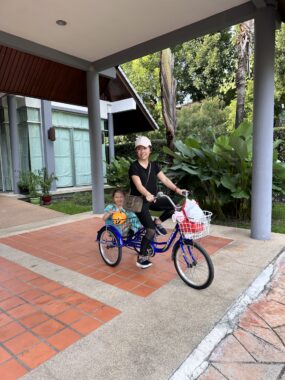How we adapted our Halloween celebration for our daughter
Trick-or-treating was successful, thanks to a supportive community
Written by |

Our family’s approach to holidays and adventures centers on celebrating in ways that support our daughter, Rylae-Ann. Since her diagnosis of aromatic l-amino acid decarboxylase (AADC) deficiency, a rare genetic disorder affecting neurotransmitter production, my wife, Judy, and I have adapted our holidays to Rylae-Ann’s unique needs.
Even after the life-changing gene therapy she received almost five years ago, Rylae-Ann is still catching up developmentally and managing her anxiety. Adjusting our plans to meet her where she’s at has turned each celebration into a deeply meaningful experience, even if we choose not to take the traditional path.
Take Halloween, for example, which fell on a Thursday this year. We knew that celebrating on a school night would disrupt her routine and, most importantly, her sleep. A good night’s rest is essential for Rylae-Ann to have a successful day at school.
So we decided to celebrate Halloween the previous weekend, which offered her the joy of the holiday while still respecting her need for routine. Our neighbors in Thailand loved the idea, too, and arranged to celebrate early with us, making it a community event that fit well into everyone’s schedule.
A successful Halloween celebration
This year, Rylae-Ann wore a blue Elsa dress, from the Disney movie “Frozen,” with flare. She was excited to shop for her costume and eagerly awaited the day she would wear it. On the Saturday evening before Halloween, she jumped into her dress and grabbed her plastic pumpkin basket.

Rylae-Ann Poulin and her mom, Judy, get ready to depart on their Halloween ride around the block. (Photo by Richard E. Poulin III)
Getting from house to house was easier and more exciting thanks to our friend, who lent us an adult tricycle with a basket in the back. Rylae-Ann happily settled into the basket while Judy pedaled door to door. I followed behind with a light jog, snapping pictures like a paparazzo.
At each stop, Rylae-Ann hopped out with excitement to collect her candy, growing more confident with every door she approached. The neighbors greeted her with open arms and showed her around the displays. Each house had an impressive mini kids center.
Everyone in our neighborhood knows Rylae-Ann very well. We didn’t have to worry about any sneaky scares or scary decorations. Everything was prepared for Rylae-Ann and the young children who decided to join our early trick-or-treating session.
The night ended before the sun had set, which was perfect. Rylae-Ann barely stayed awake to eat dinner and take a shower. Once her head hit the pillow, she was out, while Judy and I stayed up picking out our favorite candies from Rylae-Ann’s stash. We fell asleep shortly after that, too.
It was our best Halloween yet. Rylae-Ann has made tremendous strides toward independence, and by designing each experience around her needs, we find that holidays and family adventures have become even more meaningful.
While our celebrations may not be traditional, they reflect our family’s unique path and bring us endless memories we’ll cherish. For us, celebrating Rylae-Ann’s milestones and honoring her progress is what makes each holiday special.
Note: AADC News is strictly a news and information website about the disease. It does not provide medical advice, diagnosis, or treatment. This content is not intended to be a substitute for professional medical advice, diagnosis, or treatment. Always seek the advice of your physician or other qualified health provider with any questions you may have regarding a medical condition. Never disregard professional medical advice or delay in seeking it because of something you have read on this website. The opinions expressed in this column are not those of AADC News or its parent company, Bionews, and are intended to spark discussion about issues pertaining to aromatic l-amino acid decarboxylase deficiency.





Leave a comment
Fill in the required fields to post. Your email address will not be published.